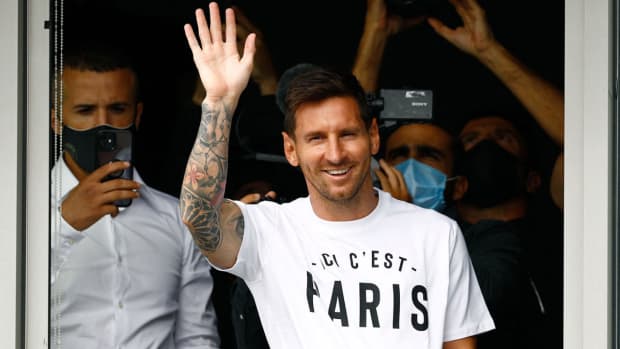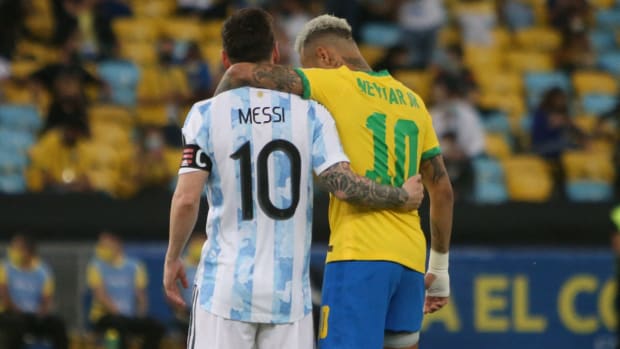After more than two decades with Barcelona, and against his publicly expressed desires, Lionel Messi is indeed headed to PSG in a landscape-altering move.
At around noon Paris time, came the news that had been widely expected since last Thursday and yet still feels incredible. After 21 years at Barcelona, Lionel Messi will join Paris Saint-Germain on a two-year deal worth around a reported $41 million per year. He'll be presented Wednesday to officially kick off an extraordinary and unexpected chapter. What even late last week had still seemed as though it may be a negotiating tactic from Barcelona turns out to have been absolutely what it looked like at face value: An expression of the almost incalculable mismanagement of Barça's finances over the past few years.
For that, at least, current president Joan Laporta, elected with Messi’s help and the promise that he could keep the club legend from leaving, is not to blame—although details are sure to emerge about whether he was in any way negligent in assuming that a deal could be done and thinking that La Liga would not impose its financial regulations. Nor can Messi really be blamed, although many have tried to put it on him. It is not his job to manage the club’s finances, to know what it could and couldn’t afford.
The suggestion that he should play for free, meanwhile, is bewildering. Not only would it be illegal under Spanish regulations, not only would Barcelona still not be able to register him due to its irresponsible wage structure, but it exposes a mindset that still sees footballers as somehow not doing a real job and not worth their market value. Nobody seems to be suggesting that club lawyers or administrators should be working for free. Messi had already agreed to halve his wages.

Sameer Al-Doumy/AFP/Getty Images
What is perhaps less palatable is that he should then opt for PSG. It is, it’s true, one of probably three clubs in the world that could afford him on his present wages, but it is also one funded by a regime with a highly questionable human rights record, one that Messi can hardly be unaware of given all the publicity around Qatar in the buildup to next year’s World Cup. Anybody who joins Manchester City or PSG, of course, is open to the same charge, but Messi has a greater freedom to choose than most. As athletes become increasingly politically active, the defense of just being a sportsman who wants to play the game holds less and less water.
From a football point of view, Messi will almost certainly thrive, at least domestically. He has played well with Neymar before, and even if Kylian Mbappé leaves—which remains possible if increasingly less likely; he's out of contract next summer and there's no indication yet whether this changes his outlook—the thought of what they could do to Ligue 1 defenses is uncomfortable. Quite what it means, or whether there is any glory in them racking up preposterous goal tallies against sides with far smaller budgets, is debatable.
PSG’s summer signings, though, are eye-catching. In addition to Messi, it has picked up Sergio Ramos, Gianluigi Donnarumma, Achraf Hakimi and Georginio Wijnaldum, the latter of which was headed to Barcelona before a more lucrative offer came from PSG. Only Hakimi, at $70 million, required a transfer fee, although it took $20 million to make Danilo Pereira’s loan move from Porto permanent. That gives PSG experience and improves the club defensively. It may also suggest a decreasing anxiety about financial fair play regulations, which will remain under heavy scrutiny given PSG's already-hefty wage commitments.

Abaca/Sipa USA
But Messi does actually pose a tactical issue for PSG in the Champions League? One of the club's problems in Europe over the past few seasons has been how in big games the forward line becomes detached from the midfield. Neither Neymar nor Mbappé is a player who can be relied upon consistently to press or fulfill defensive responsibilities, and Messi will not improve that.
Even in Pep Guardiola’s final season at Barcelona, in 2011–12, there was tension as Messi’s capacity or willingness to press waned. More recently, Messi has presented a dilemma. He has been by far Barça’s best player. He has given it a chance of winning games it would otherwise have no means of winning. But one of the reasons Barcelona has been overwhelmed so frequently in the biggest games (4–0 to PSG and 3–0 to Juventus in '17; 3–0 to Roma in '18; 4–0 to Liverpool in '19; 8–2 to Bayern in '20; 4–1 to PSG in '21) is its loss of tactical discipline and consequent openness of its midfield, for which Messi, despite all he brings to the table, is partly responsible.
It may be that manager Mauricio Pochettino can construct a system that can compensate for that, but any kind of compensation is a step away from the cohesiveness that characterizes the very best sides in the world. PSG has always been a club that had prioritized celebrity over tactical balance. Against weaker sides it won’t matter. In some games against top sides it won’t matter. But it is a vulnerability that the very best opponents will target.
And that’s perhaps the worst thing about the Messi deal, however limited the alternatives may have been. Not only has he been wrenched away from the club that created him, but he has joined a soulless project where he will help it hammer much weaker sides without necessarily making it any more likely than it already was to win the big games.
More Soccer Coverage: